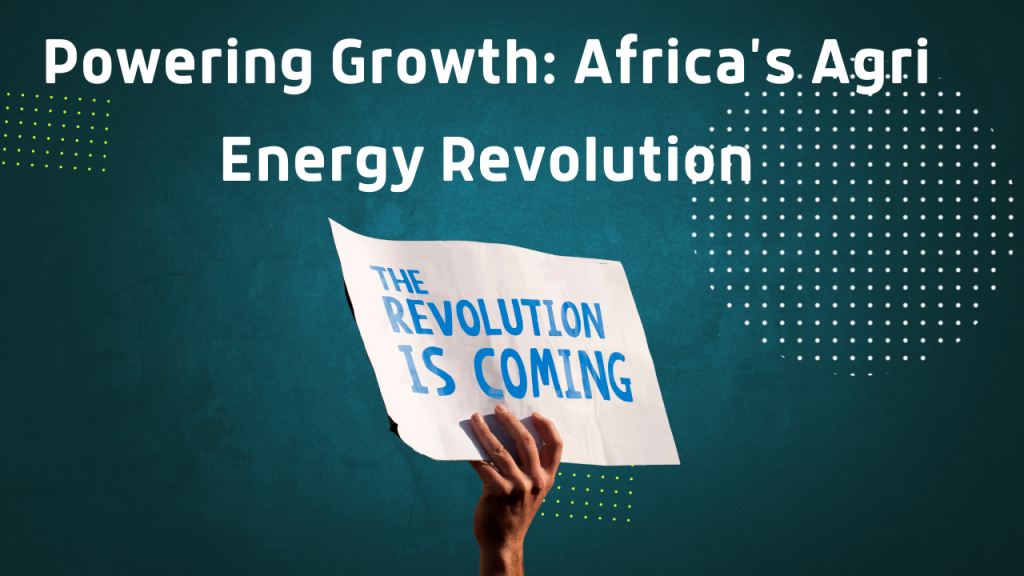
Explore how Africa’s agri-energy revolution is lighting up the continent, fostering economic growth, and nourishing communities. Discover the fusion of agri-tech and renewable energy driving this transformation.
Africa’s agri-energy revolution is underway, igniting a transformation that’s reshaping the continent’s agricultural landscape. In this article, we delve into the symbiotic relationship between agritech and renewable energy, shedding light on how they are powering growth, fostering economic prosperity, and nurturing sustainable communities. Join us on this journey through the fields of innovation and sustainability that are cultivating a brighter future for Africa.
The Agri Energy Nexus: A Powerful Duo
Africa, often celebrated for its rich agricultural heritage, is now experiencing a remarkable transition towards a brighter and more sustainable future. At the heart of this transformation is the dynamic synergy between agriculture technology (agritech) and renewable energy. Let’s explore how this power duo is lighting up Africa’s path to progress.
- 1. Agritech: Revolutionizing Farming PracticesAfrica’s agritech sector has been gaining momentum, leveraging digital solutions, data analytics, and automation to revolutionize farming practices. Smart farming techniques are optimizing crop yields, minimizing resource waste, and enhancing food security. Farmers can now monitor their fields, manage irrigation systems, and even predict weather patterns with the help of innovative agritech tools.
- These advancements are not only boosting productivity but also reducing the environmental footprint of agriculture. Precision agriculture, for instance, allows farmers to apply fertilizers and pesticides more efficiently, reducing chemical runoff and its detrimental impact on ecosystems.
- 2. Renewable Energy: The Spark for ProgressSimultaneously, the continent is embracing renewable energy sources like never before. Solar panels, wind turbines, and hydropower projects are transforming rural and farming communities by providing access to reliable and sustainable energy. These sources are not just eco-friendly; they’re also cost-effective in the long run.
- Renewable energy is overcoming the age-old challenge of electricity access in remote areas. It’s powering irrigation systems, refrigeration units, and processing facilities, ensuring that agricultural products reach markets in their freshest form. In essence, it’s electrifying opportunities and redefining the agribusiness landscape.
Fertile Grounds: Renewable Energy in Agriculture
- Africa’s agri-energy revolution isn’t confined to theory; it’s deeply rooted in practical solutions that are making a difference where it matters most – in the fields. Here’s how renewable energy is turning these fertile grounds into thriving hubs of agricultural activity.
- 1. Solar-Powered AgricultureThe sun-kissed African continent is making optimal use of its most abundant resource: sunlight. Solar-powered irrigation systems are a game-changer for farmers who once depended on erratic rainfall patterns. With solar panels adorning their fields, they can harness solar energy to pump water efficiently, ensuring a consistent supply for their crops.Solar dryers and cold storage facilities are preserving perishable produce, reducing post-harvest losses, and extending shelf life. This not only benefits farmers but also contributes to reducing food wastage, a global concern.
- 2. Wind Energy for Rural Electrification Africa’s vast landscapes often feature strong and consistent winds, making wind energy an ideal solution for rural electrification. Wind turbines dotting the countryside generate electricity to power homes, schools, and small-scale industries. This not only improves the quality of life in rural areas but also enhances the overall productivity of the agricultural sector.
- The surplus electricity generated can also be fed back into the grid, offering opportunities for income generation through feed-in tariffs, ultimately benefiting both farmers and investors.
- 3. Hydroelectricity: Tapping into Water ResourcesAfrica’s rivers and water bodies have untapped potential when it comes to renewable energy. Hydropower projects are making use of these resources to generate electricity for both urban and rural areas. This energy is a lifeline for agricultural communities, as it fuels water pumps, mills, and processing units.The irrigation capacity provided by hydropower ensures that even during dry spells, crops can thrive, reducing the risk of crop failure and food shortages.
Policies and Partnerships: Nurturing the Agri Energy Ecosystem
To sustain and accelerate Africa’s agri-energy revolution, it’s crucial to have supportive policies, strategic partnerships, and dedicated service delivery mechanisms in place.
1. Enabling Policy Frameworks
Governments across the continent are recognizing the potential of this revolution and are enacting policies that encourage the adoption of agritech and renewable energy solutions. These policies provide incentives, subsidies, and regulatory frameworks that make it easier for farmers and entrepreneurs to invest in sustainable practices.
Furthermore, renewable energy policies are attracting investments, both domestic and international, fostering the growth of the energy sector and creating job opportunities.
2. Collaboration and Knowledge Sharing
Collaboration between governments, private sector players, and international organizations is pivotal. Knowledge sharing and technology transfer initiatives ensure that the latest agritech innovations and renewable energy solutions reach even the most remote farming communities.
Partnerships are also driving research and development efforts, resulting in tailored solutions that suit Africa’s unique agricultural challenges.
- 3. Service Delivery at the GrassrootsEffective service delivery is the linchpin of this revolution. It’s not just about installing solar panels or setting up wind turbines; it’s about ensuring that these systems are maintained, repaired, and optimized for maximum efficiency.Training programs and local service providers are essential in empowering communities to manage their renewable energy assets effectively. This not only creates local employment opportunities but also ensures the sustainability of these projects.
FAQs: Unveiling the Agri Energy Revolution
- Q1: Can renewable energy really make a significant impact on African agriculture?Absolutely. Renewable energy is a game-changer for African agriculture, providing reliable power for irrigation, processing, and storage, thereby increasing productivity and reducing post-harvest losses.
- Q2: Is agritech accessible to smallholder farmers in remote areas?Yes, thanks to mobile technology, even smallholder farmers in remote areas can access agritech solutions that help them optimize their farming practices.
- Q3: How are governments supporting this revolution?Governments are enacting policies that incentivize the adoption of agritech and renewable energy solutions while also attracting investments to the sector.
- Q4: Are there success stories that highlight the impact of this revolution?Indeed, there are numerous success stories from across the continent, showcasing how agritech and renewable energy have transformed farming communities and improved livelihoods.
- Q5: What challenges does this revolution face, and how can they be overcome?Challenges include funding constraints and infrastructural limitations. However, through international partnerships, targeted investments, and capacity-building initiatives, these challenges can be addressed.
The Dawn of a New Agricultural Era
In closing, Africa’s agri-energy revolution is not a distant dream; it’s a tangible reality shaping the continent’s future. The fusion of agritech and renewable energy is powering growth, fostering economic prosperity, and nurturing sustainable communities. As we cultivate this brighter future for Africa, let’s remember that innovation and collaboration are the driving forces behind this remarkable transformation. Join the revolution, and together, we transform Africa’s agriculture.





















